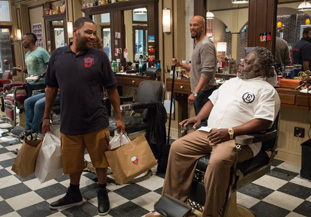Movie Review - Barbershop: The Next Cut
By Ben Gruchow
April 25, 2016
Already, then, we have story material meatier and weightier than what we've dealt with in this franchise before, and Lee gets a lot of mileage out of his cast and environment on the strength of that tension: a brief moment involving sudden gunshots plays no significant narrative role, but encapsulates that unsettling harmonization. And the tension arguably makes the movie more seamless and naturalistic about tying together its storylines than its predecessors, which lets it devote a good majority of its effort to being a very funny ensemble piece. The Barbershop series has always seemed to use its plot (generally pretty standardized elements) as a clothesline on which to hang a series of informal roundtables: intensely personal and colorful commentary, observant and irreverent and sharp. We will start a scene, a topic will be introduced as a situation, and the scene's participants will take turns analyzing and reacting to it. 2005's Queen Latifah spin-off Beauty Shop did this, too.
Most of the spotlight during these monologues falls on Cedric the Entertainer as Eddie, who generally gives the longest and most irreverent responses. Increasingly, Eddie has also become something like the id of the series, as well as its conscience and superego. He's the one character who always seems to partially exist outside these films; that moment with the gunfire creates tension, which is then alleviated by his response to the others' calls for him to get down: no, he says, because it would take him too much time to get back up again. He performs an important function in this film's storyline, and takes part in a late conversation that thematically references a similar conflict in the first film without repeating it.
Your mileage on this film's comedic elements may vary; there is language and humor used here that may be too harsh and confrontational for some, despite the film's PG-13 rating. It's smartly mounted, and about as honest in its approach as a $20 million feature within its genre can be. This is a film where the occasional dip into sophomoric humor works, because it fits into the context of the scene and players. Lee, Barris, and Oliver seem to know when their plot is approaching mawkish territory (as in a nighttime basketball game between Calvin and his son after hints of gang association begin to turn up in their house) or sanctimony (when one individual has a change of heart and decides against a pivotal action), and dial the material back appropriately.
Enough words have not been written, and enough credit has not been given, to the female characters in the film. Regina Hall is this installment's major new addition; she does not dominate the screen in the way Queen Latifah did, but her character - a beautician who merged her shop with Calvin's to pool resources and save money - holds her own against any of the cast. And Margot Bingham as Keyana, a stylist with pronounced viewpoints on gender roles and politically correct social norms, manages to sell her character in spite of the fact that she basically exists for commentary's sake. Only Nicki Minaj as Draya fails to make much of an impression; how much of this is due to the spare dialogue afforded the skeletal arc she's given and how much of it is due to Minaj's breathy and somehow afflicted reading, I can't tell.
Overall, it's something of a genuine shock: a 12-years-later sequel to a good mid-level franchise, with a writing and directing team new to the series, and it ends up being superior to any of the prior installments. And not by a particularly slim margin, either; as someone who enjoyed all three of the prior films, I grant them their likability and their success on the foundation of their character dimensionality and byplay, while conceding that the storylines themselves were pretty rote, and reminiscent of a lesser film. This one has too much on its mind at the surface and underneath it, and too certain of a compass, for that to be the case.
Continued:
1
2
|
|
|
|




